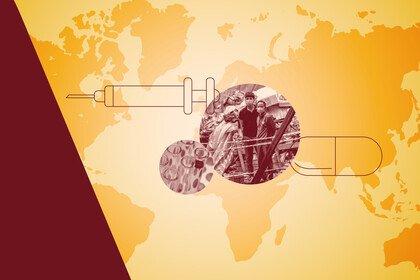
Wellcome statements on Monkeypox
All media statements issued by Wellcome to date in response to the global Monkeypox outbreak.
Saturday 23 July 2022
Media statement in response to the WHO declaration of a Public Health Emergency of International Concern (PHEIC) for Monkeypox
Dr Josie Golding, Head of Epidemics and Epidemiology at Wellcome, said:
“Our world is growing increasingly vulnerable to outbreaks of infectious disease. The declaration of another Public Health Emergency of International Concern should serve as a stark reminder to world leaders of this modern reality, and the weaknesses in our collective ability to prepare and respond.
“With Monkeypox cases continuing to rise and spread to more countries, we now face a dual challenge: an endemic disease in Africa that has been neglected for decades, and a novel outbreak affecting marginalised communities. Governments must take this more seriously and work together internationally to bring this outbreak under control.
“Tried and tested public health measures including strengthened disease surveillance, contact tracing and equitable access to tests, treatments and vaccines for those most at risk is crucial. But governments must also support more research to understand why we are seeing new patterns of transmission, evaluate the effectiveness of our current tools and support the development of improved interventions.
“Without this swift and concentrated action, Monkeypox will continue to infect even more people unnecessarily and become established in more populations, including the risk of reverse spillover into animals. We cannot afford to keep waiting for diseases to escalate before we intervene.”
Saturday 25 June 2022
Media statement in response to the WHO Emergency Committee’s recommendation not to declare a Public Health Emergency of International Concern (PHEIC) for Monkeypox
Professor Gordon Dougan, Director of Infectious Disease at Wellcome, said:
“This outbreak is another reminder of our shared vulnerability to infectious disease. Rather than firefighting, we need to work internationally to prevent future infections like Covid and Monkeypox from escalating.
“Governments do not need to wait for an official declaration to begin acting in a coordinated and measured way. Where cases have been identified, rapid public health responses such as enhanced disease surveillance, contact tracing and self-isolation will be crucial. But with the virus continuing to spread, all countries must step up, integrate their preparations and help those with limited capability.
“The world must not repeat any mistakes of the past two years. Even though mass vaccination is not recommended, some nations have begun rushing to acquire doses. But while high income countries are now paying attention to this virus, Monkeypox has been affecting people in West and Central Africa for decades. And with new cases now being reported in other low- and middle-income countries, we must ensure that these lifesaving tools are equitably distributed to where they are needed most.
“If we are to control outbreaks earlier, we need governments, funders, regulators and industry to sustain momentum. This includes establishing clinical trials of the required scale and design for improved Monkeypox vaccines and treatments.
“The G7 Summit is a test for world leaders. The risk of new infectious diseases emerging and escaping out of control is rising. But by working together and implementing bold reforms, we can transform our global surveillance, research and manufacturing capabilities and deliver tests, treatments and vaccines to those who need them, saving as many lives as possible.”
